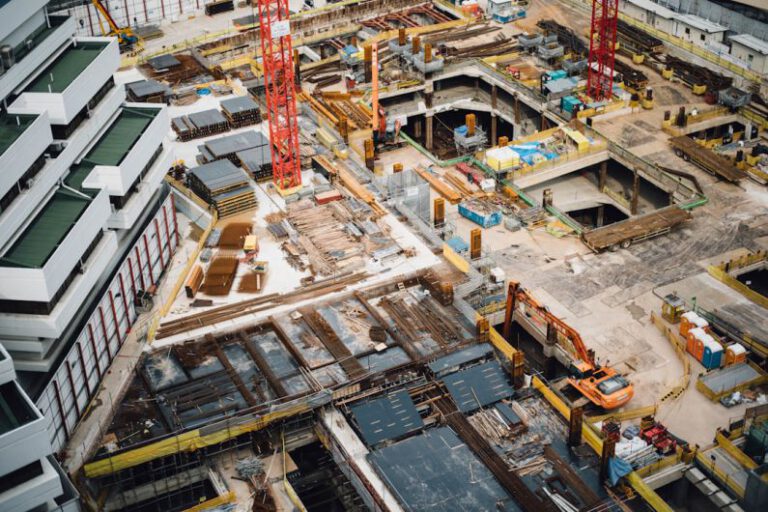How Does Ai Help with Construction Project Management?
In the fast-paced world of construction project management, the need for efficiency, accuracy, and optimization is paramount. With the advent of Artificial Intelligence (AI), the industry has been revolutionized like never before. AI has become an indispensable tool for construction project managers, offering a wide array of benefits that streamline processes, enhance decision-making, and boost overall project success rates. Let’s delve into how AI is transforming construction project management.
Enhanced Data Analysis and Predictive Insights
One of the key ways AI is transforming construction project management is through enhanced data analysis capabilities. AI algorithms can analyze vast amounts of data in real-time, providing project managers with valuable insights into project progress, resource utilization, budget tracking, and risk assessment. By leveraging AI-powered analytics tools, project managers can make data-driven decisions that are based on accurate and up-to-date information, leading to improved project outcomes.
Predictive analytics is another valuable application of AI in construction project management. By analyzing historical data and trends, AI algorithms can predict potential risks, delays, and bottlenecks in a project before they occur. This proactive approach enables project managers to take preemptive measures to mitigate risks and optimize project schedules, ultimately leading to cost savings and improved project efficiency.
Streamlined Project Planning and Scheduling
AI technology offers construction project managers powerful tools for streamlining project planning and scheduling processes. AI-powered software can generate optimized project schedules based on various factors such as resource availability, project constraints, and weather conditions. By automating the scheduling process, AI helps project managers create realistic and achievable project timelines that account for potential delays and resource conflicts.
Furthermore, AI algorithms can analyze project schedules in real-time and identify potential schedule conflicts or bottlenecks. By flagging these issues early on, project managers can make necessary adjustments to prevent delays and keep the project on track. This proactive approach to scheduling enables construction project managers to deliver projects on time and within budget, meeting client expectations and enhancing overall project success.
Improved Safety and Risk Management
Safety is a top priority in the construction industry, and AI technologies are playing a crucial role in improving safety standards on construction sites. AI-powered drones and sensors can monitor construction sites in real-time, detecting potential safety hazards and alerting project managers to take corrective action. By providing real-time insights into site conditions, AI helps project managers ensure a safe working environment for construction workers and reduce the risk of accidents and injuries.
In addition to safety, AI is also transforming risk management in construction project management. AI algorithms can assess project risks by analyzing historical data, project specifications, and external factors such as weather conditions and market trends. By identifying potential risks early on, project managers can develop risk mitigation strategies and contingency plans to minimize the impact of unforeseen events on project timelines and budgets.
Optimized Resource Management
Efficient resource management is essential for the success of any construction project, and AI technologies are revolutionizing the way project managers allocate and optimize resources. AI-powered tools can analyze resource utilization patterns, identify inefficiencies, and suggest ways to optimize resource allocation for maximum productivity. By leveraging AI for resource management, project managers can ensure that resources are allocated effectively, reducing waste and maximizing project efficiency.
Furthermore, AI algorithms can predict future resource needs based on project requirements and historical data, enabling project managers to proactively plan for resource allocation and avoid shortages or overages. By optimizing resource management with AI, construction project managers can improve project outcomes, reduce costs, and enhance overall project performance.
Innovative Collaboration and Communication
Effective collaboration and communication are essential for the success of construction projects, and AI technologies are facilitating seamless communication and collaboration among project stakeholders. AI-powered project management platforms offer features such as real-time messaging, document sharing, and task tracking, enabling project teams to collaborate effectively and stay informed about project progress.
Moreover, AI-powered chatbots can automate routine communication tasks, such as scheduling meetings, sending reminders, and answering common queries, freeing up project managers to focus on more strategic aspects of project management. By enhancing collaboration and communication with AI, construction project managers can improve team productivity, foster innovation, and drive project success.
In Conclusion: Harnessing the Power of AI in Construction Project Management
Artificial Intelligence is revolutionizing construction project management by offering innovative solutions that enhance data analysis, streamline project planning, improve safety, optimize resource management, and facilitate collaboration. By harnessing the power of AI technologies, construction project managers can drive efficiency, reduce costs, mitigate risks, and deliver successful projects that meet client expectations. Embracing AI in construction project management is not just a trend but a necessity in today’s competitive landscape, where staying ahead of the curve is key to achieving project success. By leveraging AI tools and technologies, construction project managers can unlock new possibilities, drive innovation, and transform the way projects are planned, executed, and delivered.






